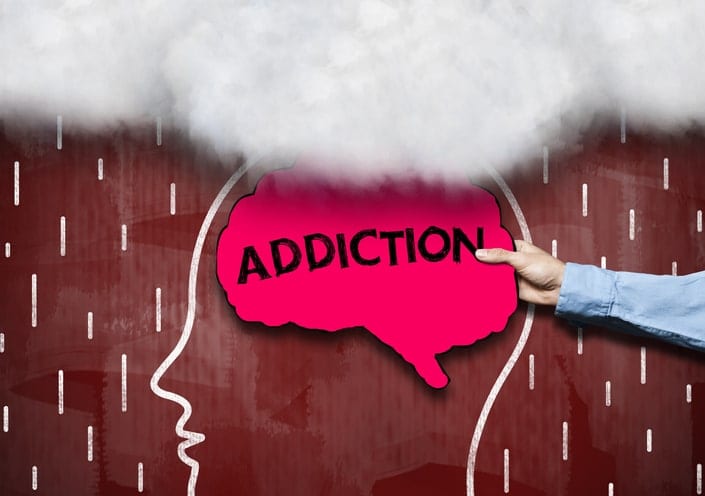 Individuals who abuse alcohol are also more likely to abuse other substances, like prescription or illicit drugs. Illicit drugs such as cocaine, heroin, and ecstasy can cause severe bodily injury and life-threatening side effects. According to researchers at the University of Michigan, men and women with alcohol use disorders (AUDs) are 18 times more likely to report nonmedical use of prescription drugs than individuals who do not drink at all. Alcohol and drugs often are used together and the repercussions can be serious: Mixing alcohol and other drugs together can lead to serious physical, behavioral and health complications. Not only can alcohol and drugs increase the effects of each substance, it can also trigger dangerous interactions. The use of both alcohol and drugs is known as polysubstance abuse and often times there can be an underlying trigger such as mental health disorder that plays into the development of this polysubstance abuse.
Individuals who abuse alcohol are also more likely to abuse other substances, like prescription or illicit drugs. Illicit drugs such as cocaine, heroin, and ecstasy can cause severe bodily injury and life-threatening side effects. According to researchers at the University of Michigan, men and women with alcohol use disorders (AUDs) are 18 times more likely to report nonmedical use of prescription drugs than individuals who do not drink at all. Alcohol and drugs often are used together and the repercussions can be serious: Mixing alcohol and other drugs together can lead to serious physical, behavioral and health complications. Not only can alcohol and drugs increase the effects of each substance, it can also trigger dangerous interactions. The use of both alcohol and drugs is known as polysubstance abuse and often times there can be an underlying trigger such as mental health disorder that plays into the development of this polysubstance abuse.
Alcohol and stimulants
Alcohol is a CNS depressant and when taken with stimulants such as cocaine or amphetamines, alcohol can decrease the effectiveness of the stimulant, which can increase the likelihood of an overdose. It is common for high school and college students to abuse Adderall, a prescription stimulant used to treat ADHD and narcolepsy. Adderall is commonly abuse to pull long study sessions for exams or used as a stimulant at parties and when combined with alcohol can be increasingly dangerous. Additionally, when stimulants are used for medicinal reasons, the effect of the stimulant is negated by alcohol.
Alcohol and opioids
Alcohol and opioids are both CNS depressants and when taken together, the effects can be intensified. Alcohol and prescription painkillers such as hydrocodone, oxycodone, and morphine are particularly deadly when mixed and the risk for overdose increases dramatically. Even if an individual takes a painkiller as prescribed and drinks a small amount of alcohol, the drugs can enhance each other’s effects. Common signs and symptoms associated with alcohol and opioid intoxication include nausea and vomiting, confusion, drowsiness, depressed/slow breathing, loss of coordination, decreased inhibition, and coma.
Alcohol and benzodiazepines
Benzodiazepines are often prescribed for seizure disorders and specific anxiety disorders and work on the same receptors in the brain as alcohol. In fact, alcohol withdrawal is often treated with benzodiazepines and withdrawing from either benzodiazepines or alcohol alone can result in fatal withdrawal symptoms. When alcohol and benzodiazepines are taken together, the effects can increase drastically and when these substances are no longer taken, the withdrawal effects can be life threatening. Individuals who misuse benzodiazepines are often under the impression that using prescription medications with other drugs is a safer practice than using illicit drugs in combination with alcohol or other drugs.
Alcohol and cold medicine
A potentially dangerous mix is the combination of over-the-counter cold medications with alcohol. Nyquil, Tylenol cold, Theraflu, Sudafed, and Robitussin cold are some of the most common over the counter name-brand pharmaceutical cold medicines that are often used to treat runny nose, cough, sore throat, and congestion. While this may seem relatively harmful, the side effects of mixing alcohol with cold medications can produce adverse effects. Some of the common side effects of mixing alcohol with cold medication include dizziness, confusion, disorientation, shortness of breath, liver problems and more. Alcohol is known to be directly metabolized by the liver hence an overconsumption of alcohol or the chronic use of alcohol can result in liver disease, Acetaminophen, better known as Tylenol, is also metabolized by the liver and can result in direct liver toxicity if taken in large dosages (4 grams per day) or when mixed with alcohol. Many over the counter flu and cold medicine contain acetaminophen as a pain reliever and fever reducer and therefore the combination of these over the counter medications with alcohol can result in liver injury, liver failure, fatty liver or chronic liver diseases such as cirrhosis.
